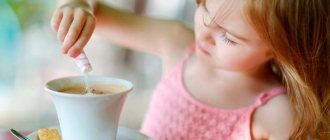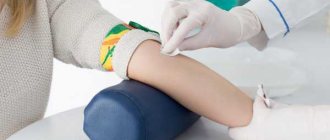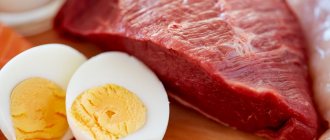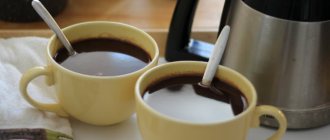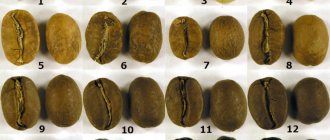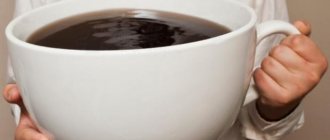From our article you will learn how to drink coffee correctly, and when this drink is strictly prohibited.
Coffee is the most popular drink on the planet. He is loved equally by women, men, and, oddly enough, children. In some countries, this invigorating drink is consumed exclusively for breakfast; it is believed that drinking coffee in the morning does not harm the body. But there are people who can drink coffee in large doses, from morning until evening. Is such a huge dose of caffeine harmful to human health? We will tell you how to drink coffee correctly in our article.
Can I drink coffee before meals?
Can I drink coffee before meals?
- Coffee, when consumed correctly, is a very healthy drink. And it’s not just about the invigorating properties. The drink contains nutrients beneficial to the human body. But for them to really be useful, some features must be taken into account. So is it possible to drink coffee before meals?
- Let's say right away that no. Oddly enough, the reason for the ban is caffeine. This substance does not have a very good effect on the mucous membranes of the digestive system, and if a person is hungry, it begins to irritate them greatly. And the most harmless thing you can get from drinking coffee on an empty stomach is diarrhea.
- If you do this regularly, then after a certain time you are guaranteed gastritis. In addition, it is worth considering that bitterness in coffee stimulates the flow of bile. And if you intensify it on an empty stomach, then you will be guaranteed aching pain in the abdominal area.
Can I drink coffee after eating?

Can I drink coffee after eating?
- After reading the previous information, you probably decided that you can drink coffee after meals. In principle, yes, this option is preferable, but even in this case there are some nuances. If you are going to drink coffee after a meal, then do it 30 minutes after your main meal.
- If you drink breakfast, lunch, or dinner with a drink, you will dilute the gastric juice. Due to the fact that its concentration decreases, food will not be absorbed as it should. All this will lead to heaviness in the stomach and bloating. Severe heartburn may also occur. Another nuance that you should always remember is fatty foods.
- If you have eaten pork, lamb, or deep-fried foods, you can drink coffee no earlier than 3 hours later. Earlier consumption of an invigorating drink, with such a combination of products, can increase sugar levels above normal for several hours. Such a load will not pass without a trace. You will feel tired, drowsy, and will not be able to concentrate properly.
How long after eating can you drink coffee?
If you drink coffee immediately after meals, you dilute the concentration of gastric juice. Under the influence of coffee, undigested food passes further through the gastrointestinal tract, causing heaviness and bloating in the stomach. In addition, the digestion process has not yet started at full capacity, and caffeine and chlorogenic acids still reach the walls of the stomach, irritating it.
The optimal period for drinking coffee is half an hour to an hour after eating. The food is being actively digested, and additional production of gastric juice will not hurt.
How much coffee can a man or woman drink?
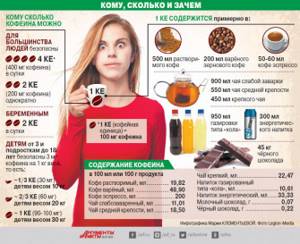
How much coffee can a man or woman drink?
IMPORTANT : If you brew coffee using an open method, without a coffee maker, then the daily dose of the invigorating drink should be halved. With this method of brewing, coffee does not pass through cleaning filters, and harmful oils get into the finished drink.
- The debate about how much coffee men and women can drink has been going on for a long time. Some people claim that you can drink 6 cups a day, just take breaks of at least 2 hours between them. But as recent research has shown, too much caffeine has a detrimental effect on the body, and it begins to work intermittently.
- To be more precise, the sleep hormone is blocked. As a result, a person begins to suffer from insomnia, chronic fatigue appears and all processes in the brain are inhibited. Recent studies have shown that the most optimal amount of coffee is 1-2 cups per day.
- True, you also need to take into account the size of the cup. A standard cup holds approximately 220 ml of drink. It follows from this that both men and women can drink no more than 440 ml of coffee per day.
Why shouldn't sick people drink coffee?
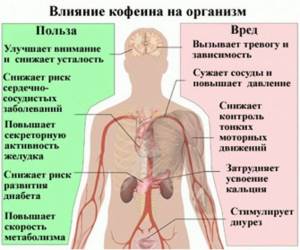
Why shouldn't sick people drink coffee?
- As you probably already understood, you need to drink coffee correctly, otherwise it can be harmful. This is especially true for sick people. Why shouldn't sick people drink coffee? The most harmless disease is an extra burden on the body. After all, he has to simultaneously maintain the normal functioning of a person and fight the cause of the problem.
- Add to all this medications, which always have their side effects. If, in addition to all this, you begin to saturate the body with large doses of caffeine, then the nerve endings will not promptly send impulses to the body that there are some problems.
- After all, coffee will make you feel more energetic, and thanks to this, the body will begin to fight the disease less intensively. In the meantime, while caffeine is eliminated from the body, the disease may worsen and the person’s condition will worsen.
Can pregnant women drink coffee?
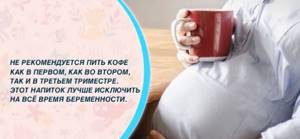
Pregnancy is both a joyful and difficult period in a woman’s life. Therefore, a pregnant woman needs to be as attentive as possible to what she eats. Coffee is also a controversial product during pregnancy. So let’s figure out why pregnant women shouldn’t drink coffee.
So:
- Coffee has one not-so-good feature for pregnant women - it leaches calcium, potassium and phosphorus from the body. The lack of these substances in the body of a pregnant woman will lead to the development of osteoporosis in her, and to problems in the formation of bone tissue in the fetus.
- Pronounced diuretic effect . If a woman abuses the invigorating drink, then the kidneys will have to work all the time, as they say, in emergency mode. And if you consider that they are already working under load for 9 months, this can lead to kidney failure.
- Coffee provokes a spasm of the vascular system , which is responsible for transporting oxygen to the fetus. In the case of constant vascular spasm, the baby will receive less oxygen, and as a result, fetal hypoxia is possible.
How long after a meal can you drink coffee?
When to drink coffee, everyone decides for themselves. But it is better to follow the advice of experts: drinking coffee immediately after a meal will worsen the condition of the gastrointestinal tract, as it will dilute the required concentration of gastric juice. The food remains undigested and begins to cause heaviness and bloating. Discomfort can be avoided if you know how to drink coffee correctly.
Coffee should be consumed 30 minutes after meals. This is the minimum time when digestive processes begin to actively work. The optimal time would be an hour and a half, when some of the food has already been digested.
Can I drink coffee with milk?

Can I drink coffee with milk?
- Lovers of coffee with milk claim that it is this that makes the invigorating drink more gentle on the body. In some ways they are, of course, right. Milk actually reduces the concentration of caffeic acids, and they have a less harmful effect on the walls of the stomach and intestines.
- Milk also helps relieve vasospasm, making it easier for the vascular system to cope with the dose of caffeine. But with all this, we must not forget that milk contains casein, which the adult body cannot tolerate. Casein has the ability to linger on the walls of the gastrointestinal tract, and thereby interfere with the absorption of food.
- The more this substance accumulates on the mucous membranes of the digestive system, the more problems a person has. Harmful salts may begin to be deposited, and problems with bowel movements will appear - for some it is constipation, for others it is diarrhea. From all this we can conclude that you can drink coffee with milk, but as rarely as possible.
Is it possible to drink coffee after meals?
If the question is “drink coffee after meals or before meals,” the answer is clear: it’s better after. Caffeine is especially harmful on an empty stomach, especially the kind found in instant coffee. The most harmful thing about natural coffee is the sediment, the grounds, and if you do not drink coffee from a coffee machine, but brew it in a Turkish coffee pot, buy high-quality disposable filters.
But the main toxicity to the digestive system is not caffeine, but the chlorogenic acids found in coffee. Once in the stomach, they irritate its walls, stimulating the production of gastric juice, which can lead to heartburn, and subsequently to gastritis and ulcers. In addition, the liver and pancreas suffer. So it’s better to drink coffee after meals, but not right away.
Never drink iced coffee immediately after meals. All undigested food will pass into the intestinal tract and rot there.
Can I drink coffee with water?

Have you ever wondered whether you can drink coffee with water? Yes, with water, periodically washing it down with a warm drink. The answer in this case will be yes. Drinking water and coffee at the same time has only advantages. In this way, you will reduce the concentration of caffeine, which means the vascular system will receive less stress.
Water will help dilute the hydrochloric acid already present in the stomach, and you can avoid heartburn if you are prone to it, of course. Well, the best part is that water will cleanse your taste buds, and you will feel the taste and aroma of coffee more strongly.
Can children drink coffee?

Can children drink coffee?
- Children really like the aroma of coffee and, as a rule, they begin to ask their parents to make them a tasty drink. Some parents don’t see anything wrong with this and give the child what he asks for. But can children drink coffee? If you ask a pediatrician such a question, he will definitely answer you no.
- The reason for this answer is the developmental features of the child’s body. While the baby is growing, all body systems have to adapt to new conditions - changes in height and weight. During this important period, all systems must work harmoniously, because if at least one fails, it will affect the well-being of the little person.
- And if a child drinks a cup of coffee, his blood sugar level is guaranteed to jump and vasospasm will begin. All this will lead to headaches, moodiness, and problems with the gastrointestinal tract. With frequent consumption of coffee, hyperexcitability will develop. Therefore, we can definitely say that children should not drink coffee.
What kind of coffee can you drink after meals?

Experts recommend drinking only espresso after meals. There is not much caffeine in one serving, since when prepared in a coffee machine, the beans are in contact with water for only a short time. You should also add a little milk, as it reduces the harm caused to the body.
It's worth giving up decaffeinated coffee, because it's still there. The harm to health will be slightly less.
Basic moments:
- It is better to drink coffee after meals, and not before, as this reduces the risk of heartburn;
- The drink is best consumed 30-60 minutes after the main meal;
- After heavy and unhealthy food, it is better to refrain from coffee treats;
- It is not advisable to drink iced coffee after meals: the risk of bloating and discomfort increases;
- A comfortable option for the body is a cup of espresso with a small amount of milk, without sugar, 45 minutes after eating.
- Don't eat on the run, try to eat right.
By following these instructions, you can avoid most problems with the gastrointestinal tract, and your health will always be fine.
You can drink coffee at high or low blood pressure
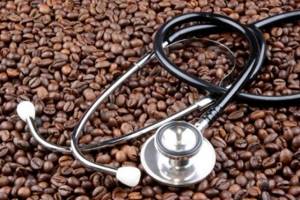
You can drink coffee at high or low blood pressure
- If you carefully read our article, you probably realized that coffee can affect the vascular system, causing vasospasm. Therefore, we can definitely say that drinking coffee with high blood pressure is strictly prohibited.
- Severe vasospasm can worsen the condition of a hypertensive patient, and this can cause a heart attack and stroke. As for hypotensive people, they can drink coffee, although not very often. In their case, you also need to be careful about the cardiovascular system. If it does not work correctly, then the pressure will jump.
- To avoid problems, try not to drink coffee before bed. Ideally, you should drink the drink 3 hours before bedtime. During this time, the body will have time to cope with the dose of caffeine, and the night will pass peacefully.
Coffee and circadian cycles
Caffeine increases the amount of cortisol in the blood. It is a stress and mindfulness hormone. Its level fluctuates throughout the day: the peak occurs at 8-9 a.m., then at noon and 5-6 p.m. During these periods, the nervous system does not need artificial stimulation.
But after every peak there is a decline. At this time, drowsiness and decreased performance are observed. A small dose of caffeine contained in a serving of coffee or a few slices of dark chocolate can give your body a boost.
There is a lot of cortisol in the blood within 1-2 hours after waking up. If you drink coffee at this time, you will gradually develop a dependence on caffeine and small doses will no longer work. It is correct to drink coffee in the morning, 2 hours after sleep.
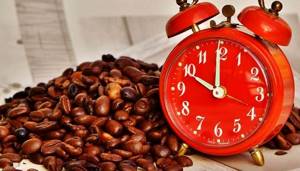
Everyone has different sensitivity to caffeine; for some, its invigorating effect lasts up to 5-6 hours. Espresso and other strong coffee drinks can be consumed only in the morning, and a latte is acceptable in the afternoon, but no later than 2-3 hours before bedtime.
Can I drink coffee before donating blood?
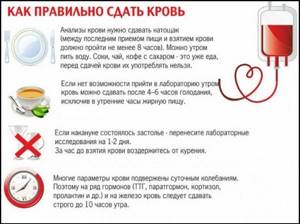
Can I drink coffee before donating blood?
- Most people don’t even think about the fact that there may be some restrictions before donating blood. Although in fact, for the analysis to give a true result, it must be taken on an empty stomach. It is for this reason that drinking coffee before taking tests is undesirable.
- If you drink an invigorating drink even a couple of hours before the procedure, the results may be distorted. There are several reasons for this. After drinking coffee, the level of glucose in the blood will jump, and the doctor will not be able to understand what caused the jump - coffee or latently developing diabetes.
- It is also worth considering that coffee contains harmful substances, and when they enter the body, the liver will start the cleansing process, which will also affect the composition of the blood. Drinking coffee before donating blood is only allowed if you just need to determine your Rh factor and blood type. In all other cases, the drink is prohibited.
Coffee in the morning: benefit or harm
Coffee drinks are traditionally reserved for the first half of the day, because it is better not to drink a double espresso after lunch, so as not to suffer from insomnia at night. In the morning, a natural drink of vigor improves performance, lifts your mood, speeds up metabolism and promotes weight loss. It will not harm healthy people if you drink it in moderation and not on an empty stomach.
On empty stomach
Gastroenterologists remind you: you should not drink coffee on an empty stomach, otherwise the consequences will not be long in coming. The chlorogenic acids it contains stimulate the secretion of gastric juice. When there is nothing to digest, the walls of the stomach suffer. If morning coffee without food becomes a habit, gastritis and ulcers may develop.
Caffeine affects not only the stomach, but also the intestines, increasing peristalsis. The laxative effect of espresso drunk in the morning on an empty stomach is especially pronounced. Over time, the digestive tract will begin to become lazy and stop doing its job properly.
Drinking coffee on an empty stomach reduces the absorption of vitamins and microelements that will be supplied with food throughout the day. This also applies to vitamin-mineral complexes.
Absolutely healthy people can drink coffee on an empty stomach in the morning, and after a maximum of 10 minutes eat something healthy. It could be porridge, yogurt or omelette. Those who do not like a hearty breakfast should at least eat a sandwich, bun or bread.
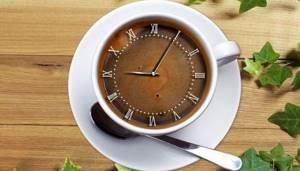
After meal
Many people are accustomed to ending their meal with a cup of hot drink and dessert, without thinking about whether drinking coffee immediately after a meal is harmful or beneficial. You should not do this immediately after eating.
There are several reasons for this limitation:
- Any liquids, including those based on coffee beans, reduce the concentration of gastric juice. As a result, there will be heaviness in the stomach or bloating.
- Caffeine awakens the feeling of hunger, and soon you will want to eat again. Frequent eating overloads the digestive organs and leads to excess weight gain.
- The diuretic effect of coffee beans causes dehydration when drinking an invigorating drink immediately after a main meal. It takes time for fluid to be absorbed in the intestines.
You can drink coffee after meals 30-60 minutes later. The optimal time interval is one and a half hours. You should first drink half a glass of clean, cool water to prepare your taste buds. It’s also better to finish your coffee drink with a few sips of water.
Drinking cold espresso (with ice) will cause food to move through the digestive tract without being fully digested.
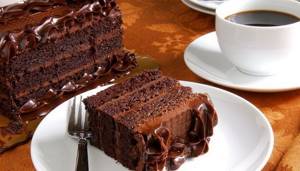
What not to drink with coffee
It is not advisable to drink coffee after eating fatty and fried foods. It turns out to be a double blow to the entire digestive system: stomach, liver, pancreas and intestines. Fats and caffeine increase blood sugar levels. If you often use them together, the risk of developing diabetes increases.
These recommendations are especially relevant when drinking milk coffee with sugar and the 3-in-1 packaged product.
After eating a fatty meal, elevated sugar levels persist for 5 hours. During this period, it is better to avoid coffee.
At what age can you drink coffee - recommendations from experts

A little higher, we mentioned that it is undesirable for young children to drink coffee. Therefore, the answer to the question, at what age can you drink coffee, suggests itself. Ideally, no earlier than 14-15 years old. You need to start with a minimum dose of literally 100 ml per day.
If the child feels normal and does not experience weakness, dizziness, or headache, then you can increase the single dose to the standard 220 ml. But still remember that at this age, drinking an invigorating drink regularly is not very advisable. Therefore, you can pamper your child with such delicacy literally 2-3 times a week.
How to drink coffee correctly - all the subtleties of drinking an invigorating drink
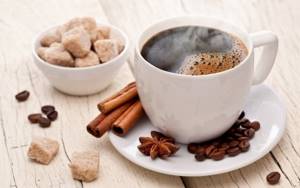
And at the end of our article, let's understand all the intricacies of drinking an invigorating drink.
How to drink coffee correctly so as not to harm the body:
- Use quality products for brewing. High-quality coffee beans contain a minimum of harmful substances, which means the body will not need to eliminate toxins in an emergency mode.
- If you do not want to harm your body, drink coffee half an hour after eating. This way the digestive system can deal with it as quickly as possible.
- Consume no more than the recommended dose of 440 ml per day. Remember that it should be divided into 2-3 doses. Be sure to keep in mind that coffee is addictive, so try to replace it with other drinks as often as possible - tea, compotes, herbal infusions.
- If you are watching your figure, then do not add sugar and milk to the invigorating drink. These foods increase calorie content, so after drinking a cup of coffee you will have to cut down on portions of healthier foods.
- For children, on the contrary, add milk, cream, and condensed milk to your coffee. This way you will reduce the concentration of caffeine, and the child will not feel vasospasm.
How long after eating can you drink coffee?
If you drink coffee immediately after meals, you dilute the concentration of gastric juice. Undigested food under the influence of coffee passes further through the gastrointestinal tract, causing heaviness and bloating in the tummy. In addition, the digestion process has not yet started at full capacity, and caffeine and chlorogenic acids still reach the walls of the stomach, irritating it.
The best time to consume coffee is half an hour to an hour after a meal. Food is being digested intensively, and additional production of gastric juice will not hurt.
Video: How to drink coffee correctly for health benefits?
On our website you can read articles about coffee:
- What will happen in the body if you drink a lot of strong coffee every day?
- How to drink hot coffee with cold water in a cafe: recommendations
- Coffee after 50 years: benefits and harm. How much coffee can you drink per day after 50 years of age?
- The use of cold coffee in medicine and cosmetology. Interesting facts about iced coffee
- How to make iced coffee: frappe, glace, Thai, English, with Amaretto and frozen espresso?


